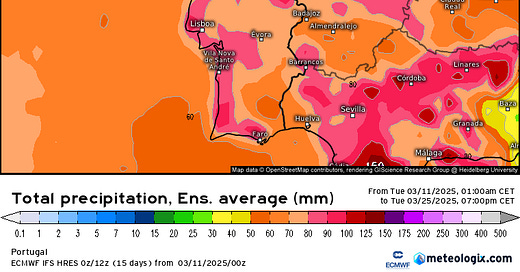Winter weather to linger in Portugal
On the plus side, the weather patterns could help ensure a summer free from drought in the south while preventing overflow and floods in the north.
Portugal has been drenched by relentless rain this March, particularly in the northern and central regions, where water levels are already exceeding monthly averages.
By March 10, accumulated rainfall had surpassed the typical totals for the entire month, making it virtually certain that this will be one of the wettest Marches on record for mainland Portugal.
However, the rain shows no signs of letting up, with more on the way.
The depression Konrad, currently affecting the Azores, has brought strong winds of up to 120 km/hour (74.56 mph) and heavy rainfall, prompting the Portuguese Institute for Sea and Atmosphere (IPMA) to issue orange warnings for the archipelago.
A secondary low-pressure system associated with Konrad is expected to hit Madeira on Wednesday, bringing similar conditions, including winds exceeding 100 km/h (62.14 mph) in exposed areas and mountainous regions, along with significant maritime agitation.
While mainland Portugal will largely escape the direct impact of these depressions, the effects will still be felt, particularly along the coast.
An anticyclone to the north is steering these systems southward, sparing the mainland from the worst of the weather.
In fact, northern Portugal may even enjoy sunny spells and calm conditions in the coming days.
However, the maritime agitation will increase, and a cold easterly flow will bring significantly lower temperatures, with Friday and Saturday potentially being among the coldest days of the year so far.
Snow is also expected in unusual locations, with snow levels potentially dropping to 400-600 meters (1312 to 1968 feet) by Friday.
Looking ahead, another depression, tentatively named Laurence, is forecast to arrive early next week, likely affecting the Azores first before potentially impacting mainland Portugal and Madeira.
While models differ on the exact timing and intensity, there is a consensus that this system could bring strong winds, heavy rain, and further cold temperatures.
The persistent rainfall has raised concerns about flooding, particularly in the Tejo and Mondego river basins, where water levels are nearing capacity.
While the rain has been a blessing for the drought-stricken south, it risks becoming a nightmare for the north and center if it continues unabated.
Despite the challenges, the current weather patterns are not unusual for this time of year.
As March progresses, the hope is that rainfall will ease, particularly in the north, while continuing to benefit the south.
For now, however, Portugal remains at the mercy of the elements, with more rain and cold weather on the horizon.
Residents are advised to stay informed and prepared as the situation evolves, with updates available from the IPMA and other meteorological services.




